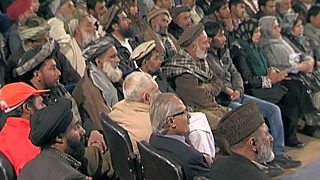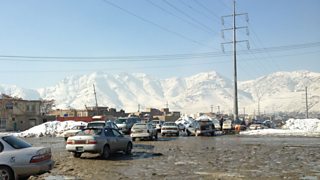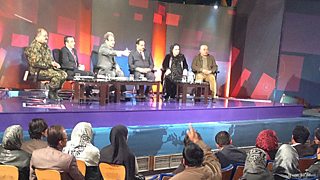Encouraging a national conversation in Afghanistan
Kathryn Tomlinson
Regional Director, Asia, ������̳ Media Action
Tagged with:

The Open Jirga studio audience asked questions about the role of political parties in Afghanistan.
As the snow melts on London I think back to my recent visit to Kabul, a city predictably better able to cope with a downfall of frozen water than my own.
Driving from ������̳ Media Action's office in the city, we saw kids throwing snowballs around us while a shopkeeper hung out cages of birds for sale.
As we drove tentatively over bumpy layers of ice – like "sliding on a bar of soap" according to our driver – on all sides men scraped snow off their roofs, only narrowly missing pedestrians below. For all that this city has grown and prospered, most houses and shops are still built of mud bricks, so the snow must be removed before it melts through the ceilings.

Kabul is stunning, surrounded by majestic mountains, although they played a part in its struggles as perfect sites from which to fire into the encircled city.
As 2013 dawned I asked many of those I met what they thought the next two years would bring - would those mountains again provide less protection than is hoped?
��
Political change post 2014
For ministers, heads of media organisations and UN expats, the ISAF draw-down in 2014 was of limited interest. More engaging was the prospect of political change, with Karzai's term of office up in 2014 and elections planned.
While potential presidential candidates are of course already sizing up their chances, key members of the elite may shift their focus to building a more party-based political process, seeking a stable and unified Afghanistan.
At the same time, the emergence of the new youth movement, Afghanistan 1400, signifies the growing role played by younger politicians, business leaders and intellectuals.
One of our staff told me that, "2014 is no longer a name. It is a concept" - a concept that apparently makes many Afghans nervous. Nobody I met, young or old, had any sense of certainty over what the future may hold.
The part that ������̳ Media Action and its partners may play in that future is potentially momentous. In December, state broadcaster Radio Television Afghanistan (RTA) and ������̳ World Service aired the first of our joint productions, Open Jirga, to huge audience acclaim.
For the first time, politicians and other leading figures are being brought face-to-face with their citizens, to answer questions brought by Afghans from across the country.

The first programme focussed on security post-2014, with a high profile panel (including the Minister of Interior, Chief of Operations at Ministry of Defence and the former head of National Directorate of Security, NDS) taking questions from an audience of nearly 70 Afghans from eight provinces across the country, including Uruzgan, Paktika, Logar, and Kapisa, as well as Kabul.
'Speaking from people’s hearts'
As the presenter tried to bring the programme to a close, the audience spontaneously rose to their feet demanding that the debate continue. A jirga is a traditional decision-making gathering, which can last for several days, until consensus is reached. Hence the audience’s cry of “Come back, the Jirga has not ended!”
When Open Jirga was first broadcast, the programme was barely over when our dedicated phone line started ringing. Viewers called from across Afghanistan, but also from Pakistan, India and Iran, offering congratulatory words of praise, encouragement, proposing topic ideas, giving feedback, and asking to be invited to sit in the audience. A few Taliban supporters called to say the Taliban were not represented in the programme, showing their interest and a challenge we are now seeking to address.
Our presenter was called by several Afghan media figures, who congratulated him on the programme, commenting on how relevant and balanced it was. And at 3am following the broadcast, our producer was woken by an apologetic man calling from Badakhshan, calling because his mother would not go to sleep until he had got through with her message that it was a programme that "spoke from people's hearts".
Our third programme, focusing on the role of political parties, will be broadcast on 28 January and was recorded in front of an audience which included representatives from nearly half of Afghanistan's 34 provinces.
I'm excited and can’t wait to hear how audiences respond to the broadcast, a bit like a child looks forward to snow.
And their snowballs are a salutary reminder that, while politicians and Westerners see 2013 and 2014 as pivotal years in Afghanistan's history, there have been few years that have not been 'pivotal' in the last half century in this embattled country. And despite everything that has passed, it continues to snow, and kids continue to play.
Whatever happens, I'm convinced that Open Jirga will play a vital role in facilitating the dialogue between ordinary Afghans and their leaders, providing a space for a much needed national conversation.
Related links
